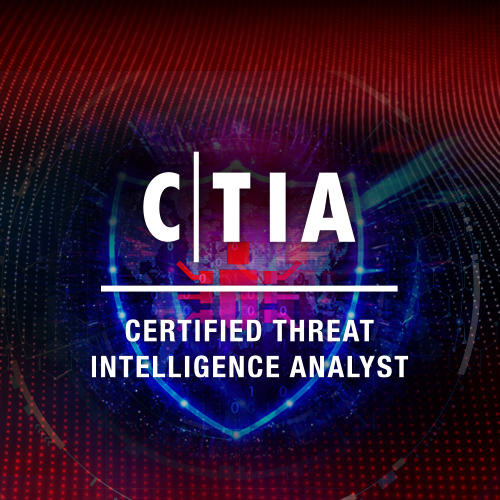
Certified Threat Intelligence Analyst | Threat Intelligence Training Certification
Cyber Threat Intelligence Training | EC-Council iClass
CTIA is a comprehensive specialist- level program that teaches a structured approach for building effective threat intelligence.
A program developed by threat intelligence experts from all over the world that is constantly updated to ensure that the students are exposed to the latest advances in the field of Threat Intelligence.
Everyone learns differently, so we offer on-demand, live, and several other options to customize your training based on your learning style. Build your package below.
Single On-Demand
Certification Course
Starting at
$999
Most Popular
Unlimited On-Demand
Certification Courses
Starting at
$3,999
Have
Questions?
Call us at
1-888-330-HACK
About the Certified Threat Intelligence Analyst Course
Course Outline
- Introduction to Threat Intelligence
- Cyber Threats and Attack Frameworks
- Requirements, Planning, Direction, and Review
- Data Collection and Processing
- Data Analysis
- Intelligence Reporting and Dissemination
- Threat Hunting and Detection
- Threat Intelligence in SOC Operations, Incident Response, & Risk Management
Who Should Attend
- Threat Intelligence
- Analysts/Specialists/Professionals/Engineers/Examiners/Associates
- Threat Hunters
- Threat Intelligence Platform Specialists/Engineers/Professionals/Associates
- Threat Intelligence Managers/Architects/Leads/Vulnerability Management Managers
- SOC Threat Intelligence Analyst/Specialists/Professionals
- Pen Testers/Ethical Hackers
- Security Practitioners/Engineers/Analysts/Specialists/Architects/Managers
- Digital Forensic and Malware Analysts
- Incident Response Team Members
- Any mid-level to high-level cybersecurity professionals with a minimum of 3 years of experience
- Individuals from the information security profession and who want to enrich their skills and knowledge in the field of cyber threat intelligence
- Individuals interested in preventing cyber threats
What You’ll Learn
- Fundamentals of threat intelligence (Threat intelligence types, lifecycle, strategy, capabilities, maturity model, frameworks, platforms, etc.)
- Various cyber security threats and attack frameworks (Advanced Persistent Threats, Cyber Kill Chain Methodology, MITRE ATT&CK Framework, Diamond Model of Intrusion Analysis, etc.)
- Various steps involved in planning a threat intelligence program (Requirements, Planning, Direction, and Review)
- Different types of threat intelligence feeds, sources, data collection methods
- Threat intelligence data collection and acquisition through Open-Source Intelligence (OSINT), Human Intelligence (HUMINT), Cyber Counterintelligence (CCI), Indicators of Compromise (IoCs), malware analysis, and Python scripting
- Threat intelligence data processing and exploitation
- Threat data analysis techniques (Statistical Data Analysis, Analysis of Competing Hypotheses (ACH), Structured Analysis of Competing Hypotheses (SACH), etc.)
- Complete threat analysis process, which includes threat modeling, fine-tuning, evaluation, and runbook and knowledge base creation
- How to create and share threat intelligence reports
- Threat intelligence sharing and collaboration using Python scripting
- Different platforms, acts, and regulations for sharing intelligence
- How to perform threat intelligence in a cloud environment
- Fundamentals of threat hunting (Threat hunting types, process, loop, methodology, etc.)
- Threat-hunting automation using Python scripting
- Threat intelligence in SOC operations, incident response, and risk management
Job Roles
- Cyber Threat Intelligence Analyst
- Cyber Threat Hunter
- Cyber Threat Intelligence Associate / Researcher / Consultant
- Cyber Security / Information Security Threat Intelligence Analyst
- Cyber Threat Intelligence Engineer / Specialist / Lead / Manager
- SOC Threat Intelligence Analyst
- Principal Cybercrime Threat Intelligence Analyst
- Threat Management Associate Director
- Project Manager / Director of Threat Intelligence
Passing Score
In order to maintain the high integrity of our certification exams, EC-Council Exams are provided in multiple forms (I.e. different question banks). Each form is carefully analyzed through beta testing with an appropriate sample group under the purview of a committee of subject matter experts that ensure that each of our exams not only has academic rigor but also has “real world” applicability. We also have a process to determine the difficulty rating of each question. The individual rating then contributes to an overall “Cut Score” for each exam form. To ensure each form has equal assessment standards, cut scores are set on a “per exam form” basis. Depending on which exam form is challenged, cut scores can range from 60% to 78%.
Exam Title: Certified Threat Intelligence Analyst
Exam Code: 312-85
Number of Questions: 50
Duration: 2 hours
Availability: ECC Exam Portal
Passing Score: 70%
Test Format: Multiple Choice
